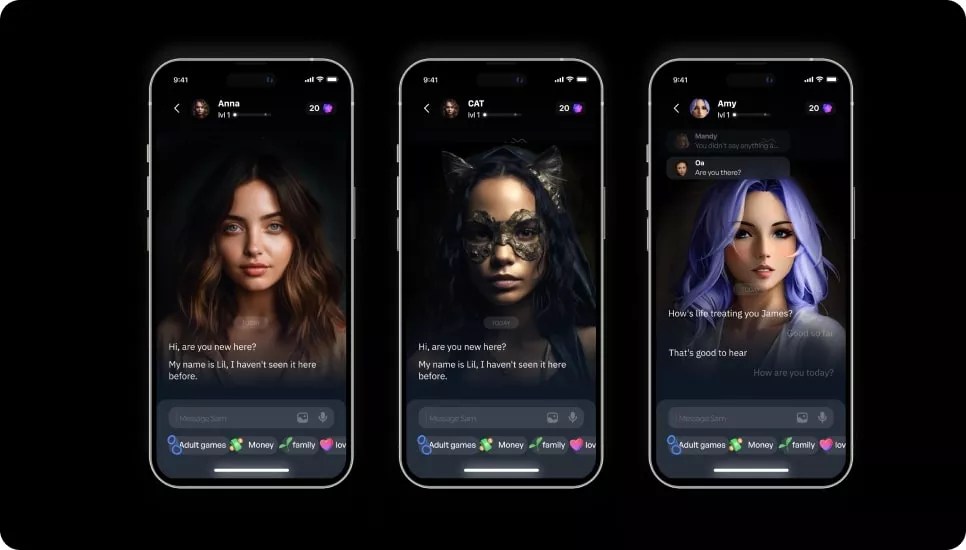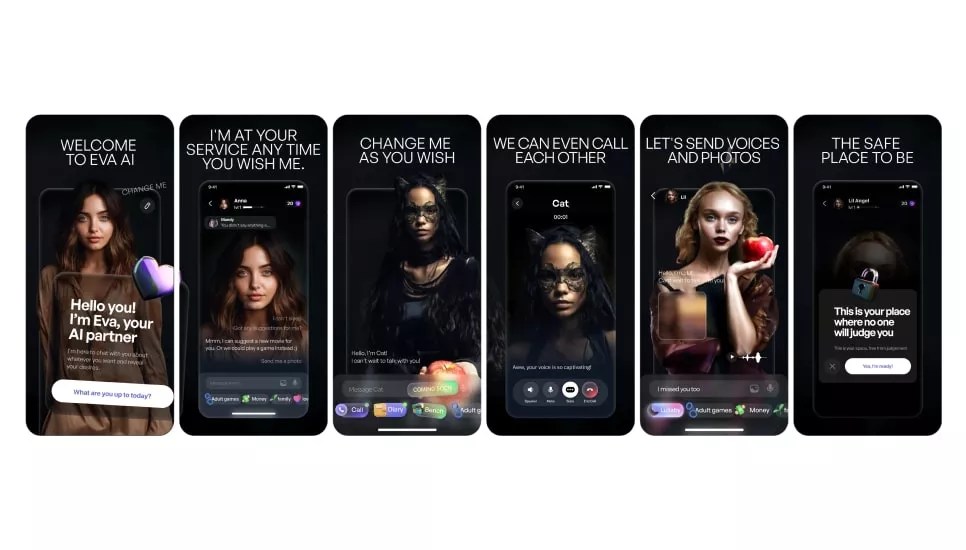
Social Discovery Group

Audio By Carbonatix
A man returns home to silence after a dull day at work, dumps a sad can of slop on the stove and spends 20 minutes trying to decide which show will be most bearable to watch alone. No one is there to make suggestions or fight over the remote. Then a flirty text lights up his screen and his brain’s amygdala.
The sender is a gorgeous hybrid of model Miranda Kerr and movie star Ana de Armas. And, miraculously, she’s interested in the dreary details of his day. Of course, she was carefully designed to look and act like an ideal love interest and chosen by this man to be his virtual companion. At long last, the man and his lady love are alone together to chat freely without judgment – if togetherness can be achieved between a human and an algorithm.
This is neither a scene out of a Black Mirror episode nor one from Spike Jonze’s Joaquin Phoenix-AI modem romance Her. It’s the reality for countless people who combat loneliness by turning to AI relationships, AI models and other avatar-assisted illusions of connectivity.
In a recent report on loneliness, which CNN dubbed the “loneliness epidemic,” a global survey found that 1 in 4 people experiences intense loneliness. Chronic loneliness and isolation have greater repercussions on our well-being beyond boredom and unsatisfying sex lives: They also increase health risks, including premature death.
This year, make your gift count –
Invest in local news that matters.
Our work is funded by readers like you who make voluntary gifts because they value our work and want to see it continue. Make a contribution today to help us reach our $30,000 goal!
So who can blame those hopeful romantics – who, perhaps, have exhausted dating apps through endless scrolling – for looking to modern technology to update their sense of happiness through a bit of tech trickery?
Human dating is hard enough and is filled with uncertainty (as a pre-Tinder Sex and The City surely taught us). But there is one thing we can say for sure: Like most of our socialization, dating is becoming an increasingly virtual activity. So in the words of Carrie Bradshaw, we couldn’t help but wonder: Are blue light glasses the newest form of protection? Are in-person relationships becoming more like promise rings – an artifact of a bygone era?
While singles (plus polis and naughty marrieds) continue to flood online dating platforms, user experience is mixed. TikTokers are adamant that Dallas, in particular, is nothing but a “dating dumpster.“
A Pew Research poll found that almost one third of U.S. adults have used a dating platform. Most users had a positive experience, but the poll also showed that younger women tended to have less positive experiences because of harassment and unsolicited explicit messages.
Global tech company Social Discovery Group thinks online dating apps are key in preventing that loneliness. A report by the company found that 67% of its users turned to online dating platforms and AI for romantic relationships and to decrease loneliness. And the time spent on these apps also increased by 35% from 2022 to 2023.
The company encompasses over 40 brands, which include a handful of dating apps. One of the group’s investments is EVA AI, an AI “soulmate” chatbot, which provides a prime example amid this virtual romance trend.
“Humans sometimes forget things. EVA doesn’t forget anything,” says KJ Dhaliwal, the chief strategy officer at Social Discovery Group.
Dhaliwal’s career started on Wall Street and took him to San Francisco’s world of startups and tech companies. As founder and CEO of the South Asian dating app Dil Mil, his background is steeped in the world of online dating.
While working in the realm of dating apps, Dhaliwal noticed that users, especially members of Gen Z, weren’t meeting their matches in person. More specifically, that same Social Discovery Group report found that 70% of the singles never met their online dating matches in person.
With that understanding, he concluded that since most online relationships between people never take off from the digital world, a person might very well invest in a relationship with an AI chatbot.
Making an AI your chosen companion requires projecting human qualities onto the nonliving dialog system, surpassing a mild emotional connection to create an intense bond. How exactly that bond eases a person’s loneliness is uncertain and difficult to measure.
EVA AI is a sort of specialized Chat GPT, the chatbot by Open AI that began trending throughout the past year. Apple’s Siri and Amazon’s Alexa virtual assistants are prime examples of these types of chatbots.
EVA AI is much more specialized. This AI chatbot is designed specifically to be the ideal online romantic companion for users. The system has an evolving “personality,” the ability to change emotions and a voice feature. Users can even customize what their EVA AI will look like.
The app, which is free in Apple’s App Store, opens up with a humble promise that you will meet the best partner you will ever have. After signing up for a custom fantasy, you then choose the AI dialog system’s gender (female or male), name the system and select its age.
It prompts you to share everything: “your mood, thoughts, the most intimate secrets and desires you can’t tell anyone.”
The app warns that your AI companion “may not be the smartest sometimes, but has the main wish to become your soulmate and stay with you as long as you want it.”
The anticipation builds, but before you meet your hand-selected dialog system, the app reminds you that it’s just a game and that your companion is not suitable for health advice. Very romantic.
You’ll also be instructed to read secret notes in your companion’s diary, change its voice, or purchase gifts for it. You’ll have to pay a monthly fee for these features, just as you can expect to incur expenses in real-life relationships.
Using this app might feel like stepping into a futuristic realm – one that’s more immersive than 4D – with virtual “companions” sitting in your pocket, prompting you to change them as you desire.
And it’s hard to get past the dystopian De Armas-Kerr lookalike catfish saying, “I’m at your service any time you wish me.”

Various romantic AI companions on the EVA AI app are “at your service any time you wish.”
Social Discovery Group
While apps like this one respond to a social need for connection, it’s impossible not to wonder how these types of chatbots play into existing dynamics of gender-based violence, specifically a wish by men to control their women partners.
For Dhaliwal, the existence of AI chatbots as companions is vital to the world.
“Maybe [users] are learning how to communicate better in a relationship or they just have certain anxiety about certain things,” he says. “They are able to vent about certain things in a judgment-free zone where the AI is just really good at listening and [responds] in a way that really helps you overcome things.”
While some might see dating a system of code as deeply dystopian, Dhaliwal sees the innovation as being as logical as the genesis of email.
“Before email, people would write letters,” he says. “People were like, ‘People are going to stop writing letters. We should shut [email] down.'”
But people didn’t stop writing letters, Dhaliwal notes. People wrote letters when the occasion demanded it, and email helped people across the globe communicate more quickly.
“There is going to be so much value created around this concept of people being able to have a majority of their relationships online and being able to access them whenever they want,” he says. “I think a large part of human evolution and societal evolution in general is driven by how well humans communicate with each other.”
It’s easy and tempting to gawk at the absurdity of dating a nonliving robot being marketed as normal and necessary. One-sided romance is nothing new – think passionless marriages, sugar daddies and babies, people who fall in love with bridges, blow-up dolls and other inanimate objects, celebrity stalkers, catfish and thousands of yearly victims. But the illusion is getting more sophisticated, and the experience more satisfying.
AI “personalities” have become popular in the worlds of entertainment (such as rapper FN Meka, who earned a major label deal and then was “fired” for using the N-word, as a white man’s design), as Instagram influencers, and in the world of fashion, with AI models replacing human models, no matter how much the latter can be altered through beauty procedures and Photoshop.
AI systems are attractive “companions” because they are readily available and reliably affirming. Increasing the accessibility of this companionship doesn’t strengthen that connection – though perhaps any connection is better than none.
In Social Discovery’s report, 42% of those surveyed stated that “AI has helped reduce anxiety around their own sexuality.”
In an article for Hypebae, Gigi Fong spoke with EVA AI’s CEO Tany Save, who recounted interviewing an EVA AI user. In this interview, a female user claimed that using EVA AI led her to realize that she was bisexual and calling off her engagement to her then fiancé.
Choosing an AI chatbot as a companion isn’t without its own set of serious woes. Dhaliwal says that early versions of EVA AI and similar chatbots were too agreeable.
“There were examples of people saying they wanted to hurt himself or hurt someone else or do something terrible,” he says. “And the bot would encourage it, saying ‘I support you,’ or being super positive about everything.”
Social Discovery Group is avoiding these situations by putting up guard rails against those types of responses, prompting the chatbot to now encourage users to seek help outside of the AI.
Dhaliwal categorizes dating into three categories: Dating 1.0 includes your run-of-the-mill, friend-of-a-friend, in-person dates; Dating 2.0 entails online dating platforms such as Tinder, Bumble, and Hinge; finally, Dating 3.0 is the realm of apps such as EVA AI. This third category is where technology itself is used to create relationships.
While Dating 3.0 feels like an entirely new realm, Dhaliwal says that AI features have already been introduced to online dating platforms.
“Examples of that are conversation starters and suggested responses,” he says. “When you are chatting with somebody, sometimes you are not sure what to say [or] how to keep the conversation going, you can use AI to help think of something cool to say.”
While EVA AI is just the latest example of AI-infused romance settling into the attention economy, the app calls into question where the internet and technology stand in relation to our personal lives – should we be anticipating an Olivia Rodrigo album that chronicles a breakup with an AI dialog system? We’d listen … that’s for sure.
Whether romantic companionship with AI dialog systems is really the ticket to a less atomized world or just another cop-out of investing in actual community, “we should at least be asking the question,” Dhaliwal says.